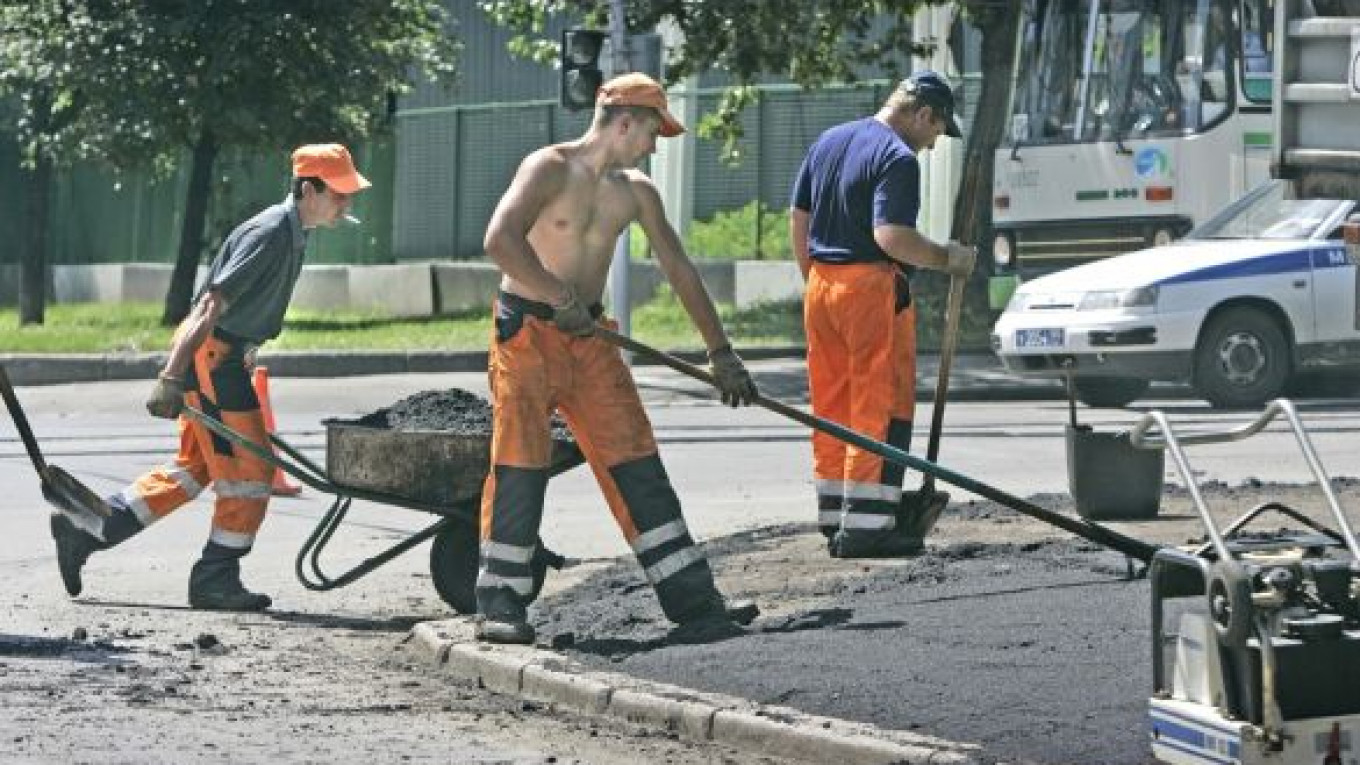City Hall needs to more than triple spending on road construction to 200 billion rubles ($6.45 billion) per year in order to cope with the city's traffic problems, First Deputy Mayor Vladimir Resin said.
Road construction is a key way to ease Moscow's notoriously huge traffic jams, so city authorities face much work ahead, Resin said.
"We need to build competently, to set goals competently. There's a whole program aimed at dealing with traffic jams," he told journalists Friday.
Resin spoke after Finance Minister Alexei Kudrin accused City Hall of not investing enough money into developing the city's streets in recent years. Kudrin said earlier this month that City Hall's revenues have quadrupled but "expenses for roads have failed to quadruple" as Moscow diverted funds to other purposes.
City Hall plans to spend about 56 billion rubles ($1.8 billion) on road construction this year, said the head of the city's road and bridge construction department, Alexander Levchenko.
While the amount is significantly behind the investment mentioned by Resin, it still exceeds the 34 billion rubles that City Hall earmarked for road construction at the beginning of the year.
City Hall decided last month to appropriate an additional 22 billion rubles, Levchenko said Friday, speaking alongside Resin.
He noted that City Hall had planned to spend as much as 110 billion rubles per year on road construction before the financial crisis hit in late 2008.
Resin said the 56 million rubles set aside for 2010 was too little.
"We have to spend 150 billion to 200 billion rubles a year, not 60 billion," Resin said, adding that it was difficult to get any money at all for roads. "You ask for a ruble and get 50 kopeks."
Road construction can cost up to 10 times more in Moscow than in other regions because of the complicated nature of urban road works and corruption, analysts said.
"Transportation overpasses and other infrastructure items that require larger expenses than just road construction are commonly built in Moscow," said Andrei Rozhkov, an analyst at Metropol.
Rozhkov said funds earmarked for road construction in Moscow also end up being spent on removing pipelines and power lines that block future roads.
"This requires additional funds and increases expenses," he told The Moscow Times.
But Moscow authorities are unlikely to spend 200 billion rubles a year even if they had it because the city lacks the necessary capacities to handle that much construction, he said.
The federal government set aside 190 billion rubles for road construction across Russia last year.
Resin said the federal government was likely to allot funds to help City Hall cope with traffic problems.
He said President Dmitry Medvedev has ordered the government to consider providing the funds and "improving the traffic situation" in Moscow as it seeks to turn the city into an international financial center.
Medvedev told Mayor Yury Luzhkov earlier this month to create "comfortable work conditions" for foreign investors, who are supposed to feel "no less comfortable than in London, Geneva or New York."
Resin said Moscow traffic congestion might ease if a general plan for Moscow's development, or Genplan, that was recently passed by the City Duma was implemented.
Critics have repeatedly said the Genplan would only worsen the city's traffic problems.
The cost of highway construction around Sochi in preparation for the 2014 Winter Games is among the highest in the world, Nezavisimaya Gazeta reported Monday.
The federal government is paying up to $200,000 per meter of highway, it said.
The government will also spend 100 billion rubles to construct a relief road for Sochi's main highway, Kurortny Prospekt, to alleviate traffic jams by 2014, said Vladimir Kuzhel, head of the road construction directorate on the Black Sea shore.
A Message from The Moscow Times:
Dear readers,
We are facing unprecedented challenges. Russia's Prosecutor General's Office has designated The Moscow Times as an "undesirable" organization, criminalizing our work and putting our staff at risk of prosecution. This follows our earlier unjust labeling as a "foreign agent."
These actions are direct attempts to silence independent journalism in Russia. The authorities claim our work "discredits the decisions of the Russian leadership." We see things differently: we strive to provide accurate, unbiased reporting on Russia.
We, the journalists of The Moscow Times, refuse to be silenced. But to continue our work, we need your help.
Your support, no matter how small, makes a world of difference. If you can, please support us monthly starting from just $2. It's quick to set up, and every contribution makes a significant impact.
By supporting The Moscow Times, you're defending open, independent journalism in the face of repression. Thank you for standing with us.
Remind me later.


